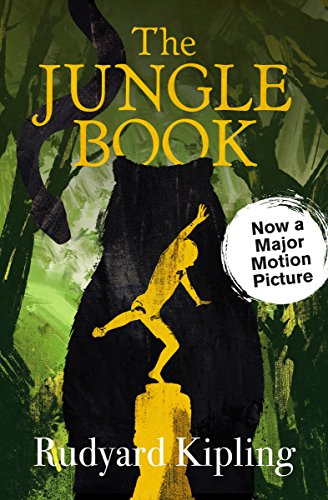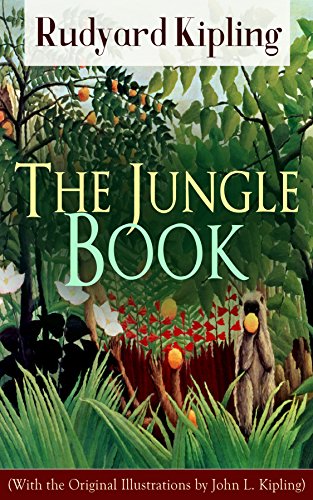-
The Jungle Book
Rudyard Kipling
eBook (Open Road Media Teen & Tween, July 1, 2014)Now a major motion picture starring Bill Murray, Scarlett Johansson, and Idris Elba: The amazing adventures of a boy named Mowgli and his brave animal friends The fourteen fables in this landmark of children’s literature tell the story of Mowgli, a boy raised by wolves in the Indian jungle. With the help of Baloo the bear, Kaa the python, and Bagheera the black panther, Mowgli learns the laws of the wild and survives countless escapades—none more thrilling than his confrontation with the menacing tiger Shere Khan, king of the jungle. Many other unforgettable characters appear in The Jungle Book, including Kotick, a rare white seal who searches for a safe haven from those who hunt him; Rikki-tikki-tavi, a brave mongoose who saves a boy and his family from a pair of deadly cobras; and Toomai, a ten-year-old elephant trainer who risks everything to witness one of the world’s greatest mysteries: the dance of the elephants. As educational as it is entertaining, Rudyard Kipling’s masterpiece has delighted and inspired generations of readers the world over. This ebook has been professionally proofread to ensure accuracy and readability on all devices. U
U
-
The Jungle
Upton Sinclair
Paperback (CreateSpace Independent Publishing Platform, Sept. 17, 2015)1906 bestseller shockingly reveals intolerable labor practices and working conditions in the Chicago stockyards as it tells the grim story of a Slavic family that emigrates to America full of optimism but soon faces despair.
-
The Jungle Book
RH Disney
Hardcover (Golden/Disney, Jan. 7, 2003)YOUNG MOWGLI LOVES growing up in the jungle with his animal friends. But what happens when he is told that he must go live in the Man-village? Find out in this Little Golden Book retelling of the classic Disney movie The Jungle Book. M
M
-
The Jungle Book
Rudyard Kipling
eBook (GIANLUCA, Sept. 18, 2019)The Jungle Book is one of Rudyard Kipling's best known works. Most of the characters are animals like the tiger Shere Khan and the Baloo bear, even if a main character is the boy or “Mowgli” puppy, which is bred in the jungle by wolves. The stories are set in India, a land dear to the writer, and are therefore able to convey to the Western reader a sense of exotic, of mystery.
-
The Jungle Book
Rudyard Kipling, John Lockwood Kipling
language (e-artnow ebooks, Aug. 27, 2015)The Jungle Book is a collection of stories. The tales in the book are fables, using animals in an anthropomorphic manner to give moral lessons. The verses of The Law of the Jungle, for example, lay down rules for the safety of individuals, families and communities. Kipling put in them nearly everything he knew or "heard or dreamed about the Indian jungle." The best-known of them are the three stories revolving around the adventures of an abandoned "man cub" Mowgli who is raised by wolves in the Indian jungle. The most famous of the other four stories are probably "Rikki-Tikki-Tavi", the story of a heroic mongoose, and "Toomai of the Elephants", the tale of a young elephant-handler. As with much of Kipling's work, each of the stories is preceded by a piece of verse, and succeeded by another. "The Second Jungle Book" is a sequel which features five stories about Mowgli and three unrelated stories, all but one set in India, most of which Kipling wrote while living in Vermont. Rudyard Kipling (1865–1936) was an English short-story writer, poet, and novelist. He wrote tales and poems of British soldiers in India and stories for children. He is regarded as a major innovator in the art of the short story; his children's books are classics of children's literature; and one critic described his work as exhibiting "a versatile and luminous narrative gift".
-
The Poison Jungle
Tui T. Sutherland
eBook (Scholastic Press, July 30, 2019)Some secrets are deadly.It's no secret that Sundew wants to destroy the HiveWings. It's her life's mission to exact revenge on the tribe that tried to wipe out the LeafWings and ripped every tree from the surface of Pantala.Every tree, that is, except the wild and dangerous Poison Jungle, where the surviving LeafWings have been hiding since the war. Hiding, plotting, and waiting for a dragon like Sundew, who is uniquely qualified to bring down the Hives.There are dark secrets in the jungle, though-some that Sundew is keeping, and some that she's only just beginning to discover. And now that a new war is upon them, Sundew and her friends must unearth the oldest secret in the jungle-even if what they find has the power to destroy them all.
-
The Jungle
Upton Sinclair, Tony Darnell
Hardcover (12th Media Services, March 2, 2018)An ardent activist, champion of political reform, novelist, and progressive journalist, Upton Sinclair is perhaps best known today for The Jungle — his devastating exposé of the meat-packing industry. A protest novel he privately published in 1906, the book was a shocking revelation of intolerable labor practices and unsanitary working conditions in the Chicago stockyards. It quickly became a bestseller, arousing public sentiment and resulting in such federal legislation as the Pure Food and Drug Act. The brutally grim story of a Slavic family who emigrates to America, The Jungle tells of their rapid and inexorable descent into numbing poverty, moral degradation, and social and economic despair. Vulnerable and isolated, the family of Jurgis Rudkus struggles — unsuccessfully — to survive in an urban jungle.A powerful view of turn-of-the-century poverty, graft, and corruption, this fiercely realistic American classic is still required reading in many history and literature classes. It will continue to haunt readers long after they've finished the last page.
-
The Jungle
Upton Sinclair
language (G&D Media, July 3, 2020)The Jungle, a novel by American journalist Upton Sinclair (1878–1968), was written in 1906 to portray the harsh conditions and exploited lives of immigrants living in Chicago and similar industrialized cities in the United States. While his main goal in describing the working conditions in the meat industry was based on an investigation he conducted for a socialist newspaper with the goal of advancing socialism in the United States, most readers were more concerned with several of the passages exposing health violations and unsanitary practices in the American meat packing industry during the early 20th century. It greatly contributed to a public outcry, which led to reforms including the Meat Inspection Act. Sinclair famously said of the public reaction, "I aimed at the public's heart, and by accident I hit it in the stomach." The book depicts working-class poverty amid a lack of social support, harsh and unpleasant living and working conditions, and a sense of hopelessness among the many workers. These elements contrasted greatly with the deeply rooted corruption of the people in power. A review by writer Jack London called it the “Uncle Tom's Cabin of wage slavery." Sinclair had spent seven weeks working incognito in the meatpacking plants of the Chicago stockyards while gathering information for the socialist newspaper, Appeal to Reason. As a journalist who exposed corruption in government and business, he was considered a “muckraker.” He first published The Jungle in serial form in the newspaper in 1905 and it was then published as a book in 1906.
-
The Jungle
Upton Sinclair, Morris Dickstein
Mass Market Paperback (Bantam Classics, Oct. 1, 1981)In this powerful book we enter the world of Jurgis Rudkus, a young Lithuanian immigrant who arrives in America fired with dreams of wealth, freedom, and opportunity. And we discover, with him, the astonishing truth about "packingtown," the busy, flourishing, filthy Chicago stockyards, where new world visions perish in a jungle of human suffering. Upton Sinclair, master of the "muckraking" novel, here explores the workingman's lot at the turn of the century: the backbreaking labor, the injustices of "wage-slavery," the bewildering chaos of urban life. The Jungle, a story so shocking that it launched a government investigation, recreates this startling chapter if our history in unflinching detail. Always a vigorous champion on political reform, Sinclair is also a gripping storyteller, and his 1906 novel stands as one of the most important -- and moving -- works in the literature of social change.
-
The Jungle
Upton Sinclair
eBook (Dover Publications, March 12, 2012)An ardent activist, champion of political reform, novelist, and progressive journalist, Upton Sinclair is perhaps best known today for The Jungle — his devastating exposé of the meat-packing industry. A protest novel he privately published in 1906, the book was a shocking revelation of intolerable labor practices and unsanitary working conditions in the Chicago stockyards. It quickly became a bestseller, arousing public sentiment and resulting in such federal legislation as the Pure Food and Drug Act.|The brutally grim story of a Slavic family who emigrates to America, The Jungle tells of their rapid and inexorable descent into numbing poverty, moral degradation, and social and economic despair. Vulnerable and isolated, the family of Jurgis Rudkus struggles — unsuccessfully — to survive in an urban jungle.A powerful view of turn-of-the-century poverty, graft, and corruption, this fiercely realistic American classic is still required reading in many history and literature classes. It will continue to haunt readers long after they've finished the last page.
-
The Jungle
Upton Sinclair
Hardcover (Chump Change, Oct. 7, 2016)The Jungle is a 1906 novel written by the Pulitzer Prize winning journalist Upton Sinclair (1878–1968). Upton Sinclair wrote the novel to portray the changing lives of immigrants traveling to the United States and landing in Chicago or other industrialized cities. Sinclair exposed shocking government and business corruption in this 1906 best seller. He worked undercover in the meatpacking Chicago stockyards to describe in true detail the horrific conditions among workers and the food they produced. His work, intended as a message to promote socialism, instead caused changes in the food industry with laws signed by Theodore Roosevelt as the Pure Food and Drug Act and the Meat Inspection Act. “I aimed at the public's heart,” Sinclair wrote, “and by accident hit its stomach.”
-
The Jungle
Upton Sinclair
Paperback (Independently published, Sept. 4, 2019)Written in 1906, The Jungle portrays the exploitation of immigrants and harsh working conditions in America’s industrialized cities. The novel follows the life of Jurgis Rudkus, a Lithuanian immigrant struggling to make ends meet for his family as a meatpacking worker in Chicago. Jurgis came to the United States to pursue the American Dream, but he soon finds that the reality of life in America falls far short.